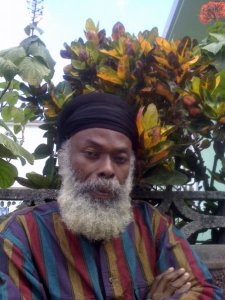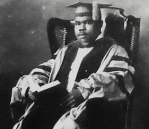
“One hand washes the other.”
Greetings and welcome to PANTHER NEWSLETTER
VOLUME TWO: ISSUE 14
This month has been another record-breaking one for PANTHER NEWSLETTER by way of the volume of comments posted from around the world. Thank y’all for logging on, reading and taking time out to post your comments.
For those of you who would like to subscribe to PANTHER NEWSLETTER, you now have three options. You can subscribe by submitting your email address, or subscribe by submitting your email address via the RSS feed, or for those of you who regularly use Face Book, you can click on The Face Book Networked Blogs Logo and follow PANTHER NEWSLETTER. Either way, y’all will be updated of a new issue each month. Check it out on the main page, it’s simple and subscribing is free.
Welcome to our new readers from Poland, Italy, Israel and the USA, PANTHER NEWSLETTER’s usual message to y’all is…
“Rock and come in.”
In this issue of PANTHER NEWSLETTER we have a conscious ARTIST OF THE MONTH, who hails from Oakland California; the FEATURED STORY, a brand new lick, THE MUSICAL COA-COA BASKET, check it out; the FEATURED ARTICLE by our guest writer Ras Flako Tafari who hails from Montego Bay Jamaica via Florida, and everybody’s favourite THE CULTURE CORNER.
SO KICK BACK AND ENJOY PANTHER NEWSLETTER ISSUE 14
EVERYTING BLESS
NEWS (UK)
Boy, 15, Arrested Over Bus Death
A boy aged 15 has been arrested after a youth he is suspected of chasing was hit and killed by a bus; more…
National Theatre in Race Row
The National Theatre Wales is at the centre of a race row over claims that it “demeaned” the Somali community by circulating flyers depicting a cartoon Somali cab driver; read on…
Education Leaders Unite Against Student Visa Cuts Plan
Leading figures in higher education have attacked government plans to limit UK visas for international students; continued…
Congratulations to my team Birmingham City Football Club!
Birmingham City were true to both the words of their club anthem and mantra of manager Alex McLeish as they reached their first major Wembley cup final in 55 years; here… ; and watch the highlights and goals here…
AFRICA
Speculation Over Mandela’s Hospitalization
Nelson Mandela, the beloved but increasingly frail hero of South African democracy, remained hospitalized for a second day here Thursday for what his foundation called “routine tests”; more…
Sudanese Opposition Leader Arrested
Sudanese security forces have arrested a top opposition leader who suggested the country is ready for a Tunisia-style uprising; continued…
Nigeria‘s Top Banker Wins International Recognition
Nigeria is frequently cited as one of the most corrupt countries in the world, but its central banker has won two international banking awards; here…
CARIBBEAN
Survivors Gather On Anniversary Of Haiti Earthquake
It was a day of mourning on the one year anniversary of the earthquake in Haiti. In Tampa, survivors gathered to reflect what they lost; watch the news report here…
Sizzla: “I will not condemn Robert Mugabe.”
He’s no stranger to controversy, having long been used as the poster child for the exasperating ‘homophobia in reggae’ debate and once again, much loved reggae star Sizzla Kalonji hit the headlines more recently because of a perceived affiliation with Zimbabwe’s notorious President Robert Mugabe; read on…
ALL THINGS POSITIVE
A CALL TO MEN
Tony Porter, (who is an educator and activist who is internationally recognized for his effort to end violence against women. Full bio and more links here), makes a call to men everywhere: Don’t “act like a man.” Telling powerful stories from his own life, he shows how this mentality, drummed into so many men and boys, can lead men to disrespect, mistreat and abuse women and each other. His solution: Break free of the “man box”; check out his story here…
FROM HOMELESS TO HOUSEHOLD NAME
Ted Williams, whose deep, velvety voice and touching story prompted an outpouring of sympathy and job offers from across the country, has become an overnight sensation and he’s America’s hottest and most improbable star; check it out here…
PANTHER NEWSLETTER ANNUAL SUMMARY
From its conception to its launch in November 2009, PANTHER NEWSLETTER has grown from strength to strength and has recorded around 17,000 hits in its first year! We give thanks to y’all for logging on and we welcome you to read our Annual Summary here…
MUSIC
CHERRI POET
Rising Reggae Rap Star Cherri Poet sent me this link. She was interviewed by Joanne “BlackPoet” Stephen on All Black Radio, Brooklyn New York, January 12, 2011. PANTHER NEWSLETTER is planning to feature Cherri Poet as an ARTIST OF THE MONTH real soon; stay tuned for that. Meanwhile check out Cherri’s radio interview here…
IMELDA MAY
The hugely talented Imelda May sings “Inside Out” and her interview with Graham Norton; watch it here…
EVENTS
Do you know a woman who deserves special recognition? Has she been encouraging and helping others despite her own situation? Does she work hard everyday and never thinks about herself? We would LOVE to hear your stories.
Well make sure you note down this date in your diaries for an amazing event organised by an amazing woman Makeda Ubiaro. THE AMAZING WOMAN AWARDS 2011 will take place at THE ASTON VILLA FOOTBALL CLUB in Birmingham on Saturday March 5th 2011. Special Guests for the night will be The Lord and Lady Mayoress of Birmingham, Joanna Riley, The Apprentice Finalist and Birmingham’s very own up and coming comedienne Annette Fagon. For more details of this event and all good things positive that Makeda does, check out her website; here…
OBITUARY
Boxer Gary Mason dies in cycling collision in London
Former British boxing champion Gary Mason has died in a cycling crash in south London; more…
Malangatana Ngwenya, Mozambican Painter and Poet, Dies at 74
Malangatana Ngwenya, one of Africa’s best-known contemporary artists, whose phantasmagoric paintings were inspired by political conditions in his home country, Mozambique, died on Wednesday in Matosinhos, Portugal. He was 74; read on…
Marvelettes founder Gladys Horton dies at 66
Gladys Horton, co-founder of Motown girl group The Marvelettes, has died at the age of 66; continued…


 Bob Marley (1945 – 1981)
Bob Marley (1945 – 1981)


